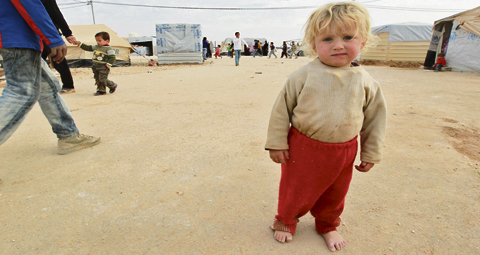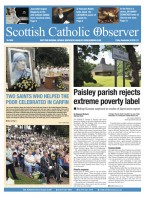September 6 | ![]() 0 COMMENTS
0 COMMENTS ![]() print
print

Hear Syria’s cries
Robert Angove, international programme manager for SCIAF, explains how the charity’s Syrian Refugee Emergency Appeal is working tirelessly to bring relief to those fleeing the conflict in Syria
—More on Syria in the September 6 re-launched print edition of the SCO, available in parishes.
The tide of human suffering amongst the millions of refugees fleeing Syria’s bloody civil war is turning into a tsunami. “Our house was destroyed by bombs,” Halabia said. “One of our children died in the attack. Two more are missing after they went outside. My husband had a series of strokes as a result. We searched everywhere for the children. But our neighbours told us that we must give up. If they were alive, they would have turned up.”
Fawaz cradles his new born baby girl in his arms, one of two twins born shortly after fleeing into Jordan. Fawaz and his wife had been running from hideout to hideout in Syria for six months after they witnessed the massacre of 40 relatives in Hama. All the members of his aunt’s family were killed. “They were caught in the crossfire,” he said. His village is now a ghost town, its 7000 residents all gone. “In Syria, there is only death now,” Fawaz said.
Current estimates put the death toll of the Syrian civil war, which started in March 201, at more than 100,000. The United Nations puts the number of innocent people displaced by the conflict at three million, with an estimated 2 million finding themselves homeless, in refugee camps, or cramped and expensive housing in Jordan and Lebanon.
In Jordan alone, where SCIAF is working with its partner, Caritas Jordan, to provide emergency aid, around 560,000 refugees have entered this small country which has a population only slightly bigger than Scotland.
Pope Francis has condemned the use of chemical weapons, when he announced a worldwide day of fasting and prayer for peace in Syria this Saturday. The Holy Father has called for a negotiated settlement of the civil war and said: “My heart is deeply wounded by what is happening in Syria… (all sides in the civil war should) listen to the voice of their conscience and with courage take up the way of negotiations.”
Caritas Internationalis, the global network of 164 Catholic aid agencies, has been helping to deal with the movement of refugees entering Jordan and the Lebanon, as well as helping displaced people in need within Syria. SCIAF has been supporting refugees in Jordan and vulnerable Jordanians who are helping to host new arrivals with emergency aid including food, water, shelter, soap, blankets, heaters and medical care.
Up to June this year, more than 146,800 Syrian people have been registered by Caritas Jordan and received help in Mafraq, Irbid, Zarqa, Amman and Madaba. With the flow of refugees increasing on a daily basis many more people will have been assisted to date.
The massive presence of Syrian refugees in villages and cities of Jordan has put huge pressure on already over-burdened public services, which are also needed by Iraqi refugees, who are still present in Jordan as they wait for resettlement or to return to their country. Basic resources such as water and electricity are also under pressure.
The cost of living within Jordan’s urban areas and lack of opportunities to work and earn money has exhausted the savings of most Syrian refugees. Moreover, Jordanians have inevitably started to voice their dissatisfaction over the presence of so many Syrians. Some work illegally to earn a living, accepting lower wages, like their Iraqi counterparts, while unemployment, and especially youth unemployment, is a growing challenge in the country. There is speculation that the large number of Syrians present in Jordan is likely to exacerbate tensions as poverty and unemployment rates increase among Jordanians, who also have to share their limited resources with refugees.
The country’s health systems are straining to cope with the increased demand. With increasing numbers of people entering Jordan with war-related injuries, long waits for basic medical care are now standard, threatening the well-being of Syrians and Jordanians alike. Private health care, while better in quality, is expensive and families often must choose between paying rent, buying food or seeking medical attention. Communicable diseases such as tuberculosis and HIV and AIDS are rising, increasing the public health threat. The country’s Minister of Health in Jordan has emphasised the importance of receiving assistance in securing highly needed medications and inoculations so that it can cope with the increasing number of refugees pouring into Jordan.
Both the needs of Syrian refugees, living in transit centres, camps or in host communities, as well as the needs of host communities have dramatically risen over recent months.
To better help the Jordanian host community cope, the Scottish Catholic International Aid Fund (SCIAF) and Caritas Jordan have targeted highly vulnerable Syrian refugee families living outside the refugee camps, particularly those who are unable to afford to pay for accommodation and healthcare.
Trauma counselling and help for new arrivals with psychological problems who have witnessed atrocities and bloody violence is an increasingly important aspect of the Church’s response. While much of the refugees’ suffering is visible, many are also dealing with the terrible things they have seen or are constantly worried about family members who remain in Syria. Depression, anxiety, insomnia, neurosis and stress are common.
In a Caritas survey of 950 Syrian men and women refugees aged between 18 and 60 in Jordan, one in five people were in need of some form of psychological therapy.
“Nobody can get on with their normal lives if they are mentally ill,” Caritas Jordan psychologist Lana Snobar said. “The refugees need to be able to talk about their experiences. They need to express their fears. We try and get them to do activities that they find relaxing like sport or socialising. Some people who don’t get treatment can resolve their issues through prayer or with the support of their family. Others develop mild or high psychological disorders.”
Caritas Jordan staff have received training in how to identify Post-Traumatic Stress Disorder and severe cases are referred to hospitals if they need intensive care.
Elderly refugees are also a particular concern. In a survey undertaken in Lebanon, 66 per cent of elderly Syrian refugees describe their health as either bad or very bad. Many elderly refugees are eating less food than they need so that younger members of the family can have better meals, and 87 per cent said they were unable to regularly afford the medication they need.
SCIAF’s Syrian Refugee Emergency Appeal has received more than £90,000 in donations from its supporters across Scotland. This has helped to make a substantial contribution to the work of helping Syrian refugees in Jordan but the scale of the problem and the ongoing needs of existing and new refugees who continue to flood across the borders means that much more aid is needed.
Ultimately, only a political solution can bring hope to those whose lives have been torn apart by this vicious war. Bishop Antoine Audo, the president of Caritas Syria, echoed this message in a recent media interview. According to Bishop Audo the way forward has ‘got to be dialogue, a political solution. The two sides have to sit down together and to choose peace in Syria, not just the domination of one group over the other. It’s the only way to reconciliation. (However) At this stage, I think only the world’s powers—Russia, the United States of America, China and Europe—can broker a solution.’
Until such time as peace returns to the troubled Syrian nation, and its people are able to return and rebuild their lives, SCIAF and its partners will continue to work tirelessly to help those in need. The emergency aid that SCIAF is providing is making a huge difference. As Rosan Kurdi, a refugee staying in Amman with her only child, recently said: “I have received many things—vouchers for the clothes and shoes you see my child wearing, medicine for him, and food and blankets. Without Caritas, I’m isolated. My only dream is that the boy will return one day to Syria.”
Over the coming days, weeks, and possibly months, please keep the people of Syria in your prayers and donate to SCIAF’s emergency appeal if at all possible. Your ongoing help with this vital work is deeply appreciated.
— To make a donation to SCIAF’s Syrian Refugee Emergency Appeal visit www.sciaf.org.uk or call 0141 354 5555











